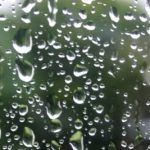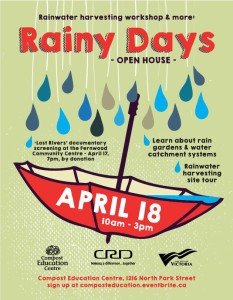Join Us For Rainwater Harvesting Education Day on April 18th!
March 20, 2015

If the rainy days of early spring are getting you down, try thinking about rainwater as your friend and ally in the garden! In Victoria, we receive an average of 2 feet of rainfall each year. Most of the rain that hits our properties and streets is flushed away through a complex stormwater collection infrastructure and pours into harbours, lakes and river systems, often taking harmful pollutants and heavy metals with it. By collecting and storing rainwater in your property, you can help prevent these pollutants from entering our waterways and treat rainwater as the precious resource it is.
Rainwater collected from a rooftop can be a high quality water source, as it contains none of the chlorine found in centralized water supplies and is the perfect temperature for plants, which makes it ideal for use in the garden. Stored rainwater provides an ideal source of readily available water, particularly during long dry summers or in locations facing declining groundwater levels. Rain gardens, permeable paving, green roofs, rain barrels, cisterns and infiltration chambers are all examples of rainwater management methods. They can create natural, beautiful landscapes and public spaces.
Learn more about rainwater harvesting systems and practices in your community!
Friday April 17th:
- Lost Rivers documentary screening at the Fernwood Community Centre, 7 pm, by donation.
Saturday April 18th, 10am – 3pm at the Compost Education Centre:
- Rainwater Harvesting Site Tour, 11:00-11:45am: Interested in seeing demonstrations of rainwater harvesting at work? Join our site manager, Alysha, on an interactive tour of the Compost Education Centre’s rainwater management systems. Topics and demos will include roof surfaces, the rain garden, our rain cistern and barrels and how Alysha uses rainwater on the site. By donation.
- Harvesting the Rain: Challenges and Opportunities, 1:00-3:00pm: Our ‘winter rain environment’ here on the West Coast poses unique challenges and opportunities for harvesting rainfall. On the one hand, our frost line is virtually non-existing making large tanks easily installed for year-round use. On the other hand, it simply doesn’t rain much during irrigation season, seriously limiting the amount that can be used in summer time. By looking at a few examples, this workshop will explore some of the ways we can optimize rainfall in our climate, from rain-tanks to ponds to rain gardens. $20, must pre-register.
Posted in Adult Education, Announcement, Blog, Events, News, Organic Gardening

